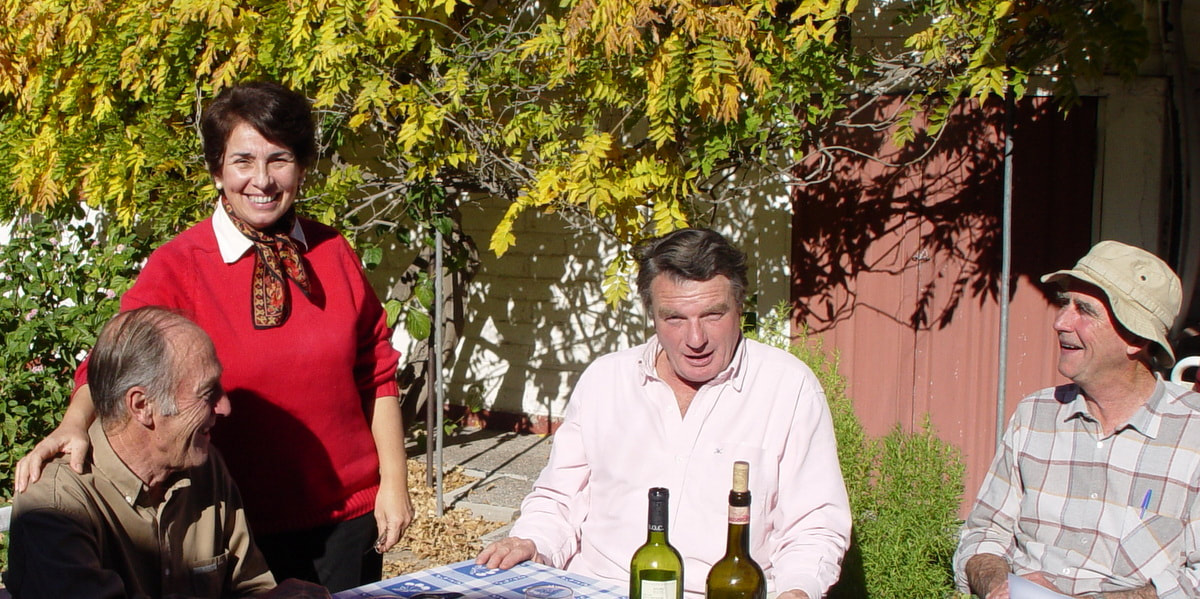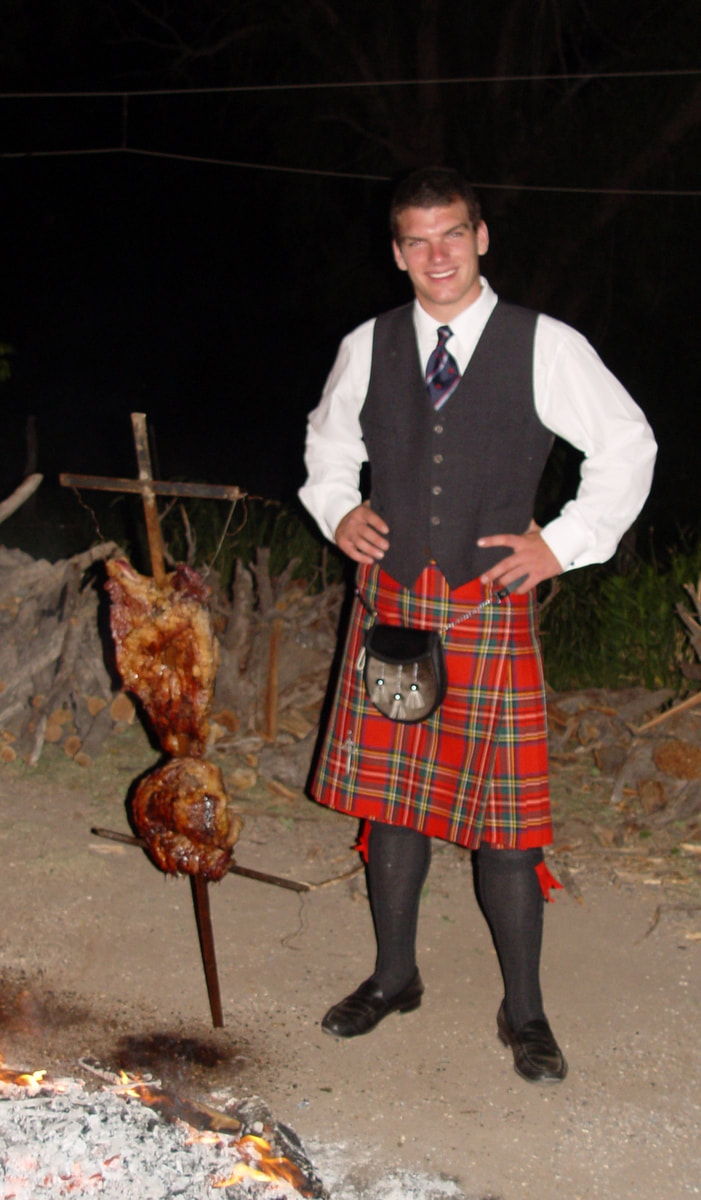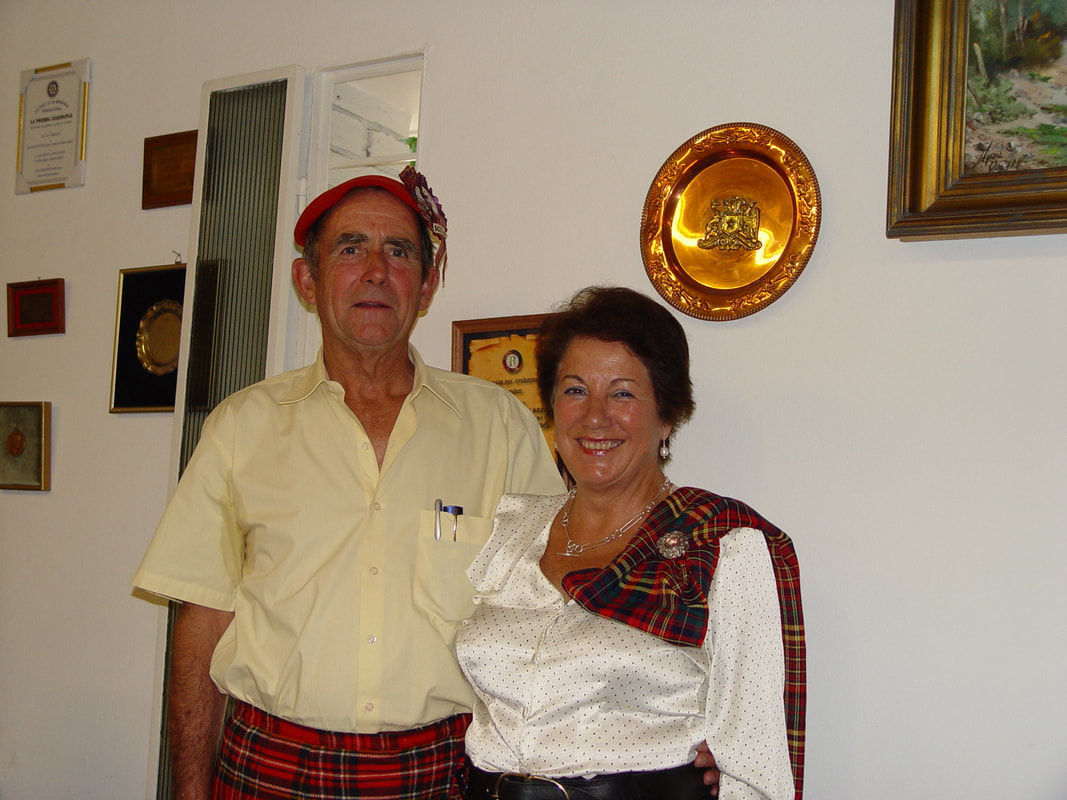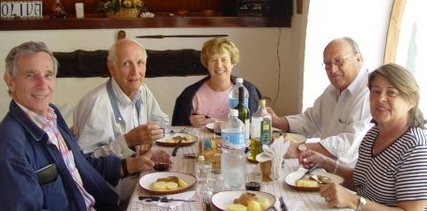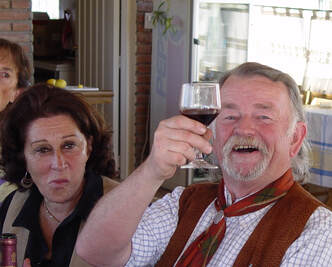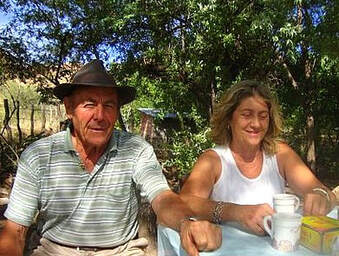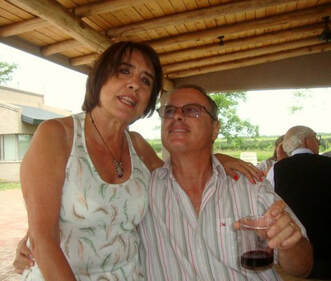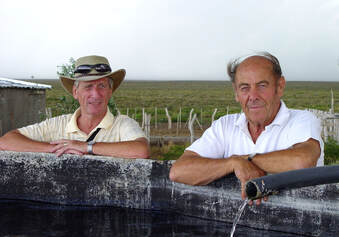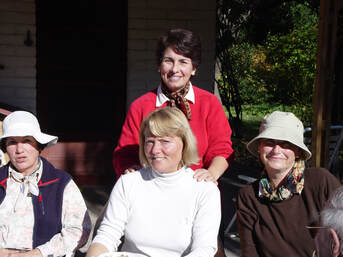Confessions of an Accidental Wino - Episode 6 by Ronald Mackay
Accident, avid amusements, and animated activities in living life as a Wino
An entirely unforeseen event provided the occasion for Viviana and I to became Winos. Our ‘Accidental Wino’ state brought tribulations but even greater joys. In previous episodes, I’ve entertained you with some of the adversities. Now, I’ll explain first, how the Accident came about, and then, tell you some of the joys we experienced.
We were born with a love for the land and dirt under our fingernails. Viviana, from a line of patient natives and diligent Italian immigrants who prospered in a productive Peruvian valley. I, from a modest family of Rechabites on Scotland’s North Sea coast and inland to the Valley of Strathmore.
So, unsurprisingly, by 2003 after a lifetime of roving, we came to own a dilapidated but promising farm in Argentina. Our mission was two-fold: to supply fine wine grapes to local wineries like Suter, Bianchi, or Roca and use the income to convert our neglected hectares into the best-run, most environmentally friendly and picturesque 30-hectare vineyard in the fruit-producing district of Rama Caída.
By mid-April 2004, we’d harvested our first crop. By “we”, I mean Viviana, me, and a local partner to whom we’d essentially gifted a stake in our enterprise in return for his agronomic expertise.
Why shouldn’t we think we were off to a good start?
***
“I’ve sold our grapes to la Bodega Suter at a good price!” Our partner appeared to be up to the role we had granted him.
“Well done! With income from the sale, we’ll prepare our vines for 2005 and plant a hectare of Malbec.” Viviana and I had done our research. Malbec was going to become the flagship red wine of Argentina.
Enthusiastically, we began to plan so as to optimise the following year’s labour and investment.
***
“The bank rejected the cheques from la Bodega Suter!” Viviana and I were devastated by our partner’s news.
“What can we do?” Our plans were crumbling.
“I’ll speak to them personally.” Loftily, our partner puffed out his chest. “I worked for Suter. I’ll fix this!”
We crossed our fingers, hoping that our future was in good hands.
***
“I tried!” Our partner sounded like a hero who had fought and failed but still carried himself with honour. “It can’t be fixed!”
We were numbed. I came up with a possible solution.
“Suter’s winery has cases of wine ready for shipping. I’ll visit them, load all I can onto my truck and sell them myself as compensation.”
“You can’t!” Our partner looked appalled
“If they won’t pay us in cash, they’ll pay us in wine!” I was adamant.
Our partner persuaded us not to pursue such a reckless course of action. However, wine and champagne flowed with abandon at the subsequent weddings of our partner’s children. Probably pure coincidence…
***
“In the future, we must turn our grapes into wine, establish our own brand, and market it ourselves.” Viviana has a practical turn of mind. If we could trust nobody, this might be the only way to save our portion of the business. We’d split the annual harvest 50:50 and go our separate ways.
And that’s how we became Accidental Winos.
No, not instead of but as well as the grape-growers we had initially set out to be. By necessity rather than by intention, we incautiously espoused, on not only the endless work demanded by a vineyard but also the responsibilities and risks involved in producing quality wine and striving to market it locally and internationally.
Gravely, Viviana and I regarded each other. “We’ve become Accidental Winos!”
We should have quaked at our wanton audacity.
***
So much for how the unexpected came about. Now for a tiny selection of the joys Argentina afforded us as Accidental Winos!
***
Shortly after we took possession of our farm, we sought advice from the local agricultural research station. Anthony Worlock, their vine specialist, answered our questions patiently.
“Where are you from?” He finally asked, having detected our peculiar accents.
“Peru,” said Viviana. “Scotland,” said I.
Immediately, Anthony switched into perfect English. “My family originally came from Forres near Inverness! My father, like many Brits, came here as a young man to help develop the railroad system.”
“My great grandfather did the same, but even earlier!” I was able to claim a shared background.
Antony continued. “My father established this station as a nursery for fruit trees and vines. His company gave them free to local settlers so that they would enjoy a reliable annual source of income as well as assure produce for the trains to transport from the frontier province back to Buenos Aires.”
Viviana had her own family tale to tell of early settlement Argentina. “My grandfather came from Rome to help plan the dams on the rivers Atuel, Diamante and Mendoza so that the settlers could irrigate the fruit trees given to them by your father.”
With so much in common, Anthony and his wife Vivian (without the final ‘a’), herself the offspring of Swedish settlers, became our firm friends.
“There’s a community of Argentine-Scots here,” Vivian told us. They still celebrate their Scottish roots. You’ll be welcome. I’ll arrange introductions.”
And so began our happy friendships with the Argentine Scots of Mendoza.
***
I can capture the bare essentials of our friendships with the local Argentine Scottish community by three rituals -- our Scots Country Dance evenings hosted by Michael and Vicky Stuart at La Susana, their charming fruit farm and, separately, by our monthly picnics to witness the rise of the full moon hosted by Michael and Chu Mohr-Bell and then by the Burns Suppers we shared together every January 25th.
***
The great room of La Susana’s century-old adobe home rang weekly with the reels and Strathspeys of Jimmy Shand’s Band spun on an ancient record player. The piano-accordion was all but drowned out by the “hoochs” and “scriechs” of the dancers, the patter of feet on the wooden floor and the enthusiastic clapping of those watching.
Vicky and Michael were gracious hosts. Their boys, James, Edward, Thomas and Charles would join us on the occasions they returned from university or from playing rugby in France, for the Edinburgh Accies in Edinburgh or the Pumas in Buenos Aires.
We all glowed after the exertions of our Scots country dancing sessions, sealing close friendships.
***
“Full moon on the last Thursday of this month!” Michael and Chu Mohr-Bell would come by to tell us. Word would be passed around. Separately, we’d drive from San Rafael, leave the asphalt road, and follow a dusty track through the chaparral and the cactus till we reached our meeting place high on a hill that afforded a view of the city lights slowly blinking on as the sun sank behind the cordillera of the snow-capped Andes.
Michael and Anthony would collect dead branches from thorn trees. They chose wood that would leave glowing embers, perfect for barbecuing. Chu, Vivian and Anthony’s sister Dinah would unload the folding tables. The Stuarts would set stones for the grills and salt the meat. Gildas and Mimi Lebaudy would unload chairs to Johnny and Claudia Hill who arranged them in a semicircle. Mike Moffat and his wife Olga would arrive from their extensive Estancia la Diamantina with wine made from their own grapes. Charlie Balbi and Bambi would arrive, Charlie proud in his traditional gaucho dress.
Once the fire had turned to hot embers, the men would lay the sausages, kidneys, and steaks on the grill. The aroma of cooking meat would overwhelm the sweet smell of the desert. Tales would be told, laughter would ring out, corks would pop, glasses would clink. As the sun set, friendly chatter would quieten, legs would be stretched in comfort, hands would be clasped, and an air of wonder at the stillness and purity of the evening would take over. Silence would prevail.
Together, in awe, we’d watch the great orb of the pale moon rise above San Rafael. A tiny segment of light would expand and rise steadily until, in its entirety, the globe gently broke free and floated higher taking our admiring eyes – and our very souls – ever upwards.
Sunset and moonrise, the gradual bleaching of crimson embers into pale ash, warmth ceding to chill. The beauty of these moments stirred in us a wonder at the timeless beauty, the easy intimacy and undemanding affection we shared.
***
A benefit of having worked in exotic places is that members of your family can be guaranteed to visit in order to discover what has taken you so far from home.
My sister Vivian (yes, yet another Vivian!) and her husband John, a proud Chelsea Londoner by birth, came to visit.
***
“We’re arriving in Valparaiso by boat.” Wonderful! That would give us the opportunity of introducing them to Viviana’s cousins in the Aconcagua Valley of Chile before driving back to Argentina over the Andes, always a spectacular journey.
And so, we did.
After breakfast one Sunday morning, Viviana suggested, “Let’s take Vivian and John to Los Reyunos!”
John was curious. “What’s there?”
“A beautiful lake that was created when a dam was built on the Rio Diamante,” Viviana explained. “My grandfather and my grandmother emigrated to San Rafael from Rome in 1923. Giuseppe Zolfi was one of the engineers who surveyed the three rivers fed by mountain snowmelt. Dams were built to turn the desert into productive farmland.”
So, on that quiet Sunday morning we drove beyond the hills to the tiny community of cottages that had grown up on the edge of the turquoise lake.
“Gorgeous,” Vivian exclaimed. Blue water, red rocks, picturesque cottages.”
We enjoyed the views until the idea of lunch prompted us to return home. As we were leaving, hands waved to us from the windows of an arriving pick-up truck. We stopped and introduced my sister and brother-in-law to Aldo and Raquel Oliva who welcomed them warmly.
“Aldo is the architect who renovated our house in San Rafael along with his son Esteban.” Viviana was proud of their work.
“Don’t forget that Viviana planned the interior of the house and made it into one of the most comfortable in the area,” Raquel was paying compliment to Viviana’s creative abilities as well as to her husband and son’s professional expertise.
“Come and have lunch at the cottage,” Aldo invited.
Delighted, we followed their truck to a tiny headland where the Oliva family cottage stood, white-walled and red-roofed with green weeping tree shading it.
Over freshly baked empanadas (like pasties or bridies) crusty bread, goat cheese and cold meat we laughed the afternoon away in both English (which Raquel speaks well) and Spanglish which John, with his ear for music, was quickly mastering.
CALEDONIA wine helped and so did the wines from Bodegas Bianchi that appeared as the laughter continued.
The wines, despite Bianchi being perhaps the most illustrious wine producer in the region and despite CALEDONIA being a mere upstart, were eclipsed by Aldo and Raquel’s innovative dessert.
“I’ll cut the melon.” Raquel showed us how to determine its ripeness.
“I’ll dress the melon.” said Aldo.
“In England, we prefer our melons undressed!”
Aldo demanded that John translate this comment that had brought guffaws from those who understood and laughed along with us at John’s Spanglish.
“So?” Aldo raised his eyebrows.
“Delicious!” John confirmed his liking for this innovative dessert by holding his bowl out to Raquel for more melon and then to Aldo for a liberal splash of gin with which to “dress” it.
We still talk about that enchanting afternoon at Los Reyunos with Aldo and Raquel. We remember with affection the laughter that enfolded us in a lasting friendship.
***
Gito Sacaiola was one of the most contented men I’ve known. He confirmed this often by telling us how fortunate he was.
“I began as a winemaker, married my beautiful wife Iris, managed the harvesting of salt from a blinding-white, long-dried-up lake created by the Rio Atuel, and finally turned to what I’d always wanted – I graze cows on my 20,000-hectare estancia and send the calves on to the Pampas to be fattened.”
Gito’s face was the mahogany of a man who spent five days a week on horseback. His smile was as white as the salt he once harvested in the desert.
“Your brother and his family are here on holiday from Australia? Then you must bring them to our estancia. They’ll see how a gaucho like me makes a living and enjoy a real Argentine asado prepared in the traditional way.”
That’s how we came to spend a day among the dry hills of the endless rocky brown dryland where of Gito’s stalwart breeding cows needed 10 hectares each to find enough greenery to survive and thrive. Gito’s estancia was an extensive grazing land where calves are born and raised for a few months before being shipped east to the Pampas to grow fat on sweet, rain-fed grass. Gito was grooming his son Juanjo, soon to graduate as a veterinarian, to take over the estancia.
“My brother’s wife doesn’t eat red meat, Gito,” I warned. Argentines are beef eaters with little understanding of those who are not.
“No problem!” Gito smiled his dazzling smile. “I’ll see she has something tasty. No red meat.”
***
Gito walked us to the top of a rocky outcrop and showed off his estancia spread out around us.
“I’ve several cottages for me and my gauchos and eight water tanks fed by pumps from the artesian basin far underground. The tanks are spread around the fringes of the estancia. Only one contains water at any given time. Cattle can smell water and walk towards it grazing as for a few days as they walk, on whatever they can find. They finally arrive and drink. I turn that pump off and switch on a more distant one. The cattle get thirsty, smell the fresh water kilometres away and slowly walk to it grazing as they go towards the new source.”
Gito, Iris and Juanjo knew and loved their land and their cattle. They respected his gauchos and treated them well. They irrigated small gardens alongside each of the cottages to supply the gauchos with fresh vegetables and splashes of bright colour in the burnt, brown drylands of dry gulches, rocks, thornbushes, and cactus.
As Gito’s chief gaucho forked huge steaks onto the grill over glowing red embers, he saw my concern.
“Don’t worry, my friend. No red meat for your sister-in-law. Something special!”
The scent of roasting beef dressed with olive oil, salt, garlic, and herbs hung in the air.
“Sit! Eat!” Gito called. “To friendship!” We raised our glasses of CALEDONIA in a toast of warm goodwill.
Gito’s gaucho carved beef steaks onto our plates.
“For your sister-in-law!” Gito proud of his thoughtful indulgence towards his guest, forked an enormous cut of pale pork onto her plate.
Politely, I turned away to avoid observing the look of utter consternation that must appear on her face.
***
The world over, Robert Burns’ birthday is celebrated on the 25th of January each year. We helped revive the practice in San Rafael. Our San Rafael Burns’ Suppers – attracting close to 70 -- were a little different from most. Because our Argentine Scottish community includes family members who are not of Scottish origin and may not speak English, we conducted our celebration in both languages – toasts, recitations, and songs.
There’s a hidden advantage. In addition to his well-known poems Burns, wrote many lewd verses. Few native Scots would be comfortable reciting these in mixed company. However, Argentine-Scot Michael Mohr-Bell took great delight in declaiming the Scots version of one of Burns’ most salacious. I won’t give away its title, but it includes the line ‘What length o' graith, when weel ca'd hame will sair a woman duly?’. I followed with a rendering in Spanish. Uproarious laughter pealed out in both languages.
Charlie Balbi brought a tear to many an eye every year, when, in his rich baritone voice, he serenaded Bambi with ‘My love is like a red, red rose.’
***
In all the togetherness of these and many, many more customs and occasions, wine added a gentle balm to the brittle casing with which we arm ourselves against unavoidable dilemmas. Whether they have business, financial, family, or emotional sources or are the unwelcome result of failing health come much too soon, wine in good company offers a soft lining of consolation.
***
“Brindemos a todos las amistades que hicimos en Argentina!” / “We raise our glasses in a toast to all the friendships Argentina brought us! Friends! Here’s to us all!”
|
Anthony, Viviana, Michael Stuart and Michael Mohr-Bell
Charles Stuart supervising a barbecue
Michael and Chu dressed for the Burns Supper
Ronald, John, and Vivian wth Aldo and Raquel Oliva at Los Reyunos
|
Bambi with Charlie Balbi
Gito with Iris at their cattle ranch (Estancia)
Olga and Mike Moffatt
Ronald's brother, Euan, at Gito's Estancia
Viviana with Chu, Vivian and Vicky
|
